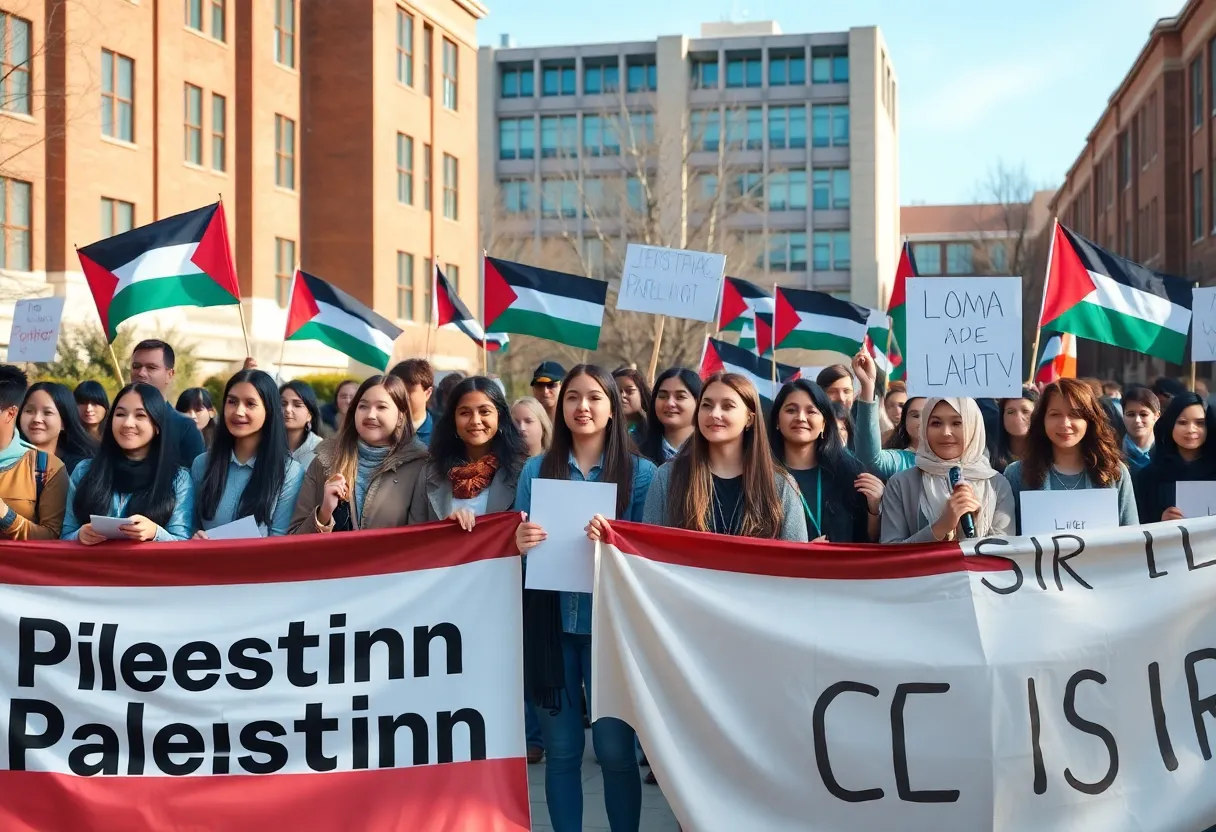News Summary
Brown University is facing significant backlash from the federal government following pro-Palestinian protests on campus, with students advocating for divestment from Israel. The protests have led to unprecedented government actions, including visa revocations for international students. Brown’s response has included suspending its Students for Justice in Palestine chapter and facing potential loss of federal funding. The situation raises important questions about academic freedom, student activism, and government intervention in university affairs amid rising tensions over the Israeli-Palestinian conflict.
Providence, Rhode Island – Brown University is facing significant backlash from the federal government following pro-Palestinian protests on campus. Students advocating for the university to divest from Israel confronted a university trustee during a protest, raising concerns over the institution’s investment choices related to the Israeli-Palestinian conflict. The protest highlighted the personal connections some students have to the conflict, as one protestor stated that their family members reside in Gaza.
In the wake of the protests, the U.S. government has taken unprecedented steps, including revoking visas and green cards of international students who have openly criticized the war in Gaza. Officials are invoking national security justifications for these actions. Notably, Rümeysa Öztürk, a doctoral student at Tufts University, was detained while observing a fast during Ramadan, reportedly for co-authoring an op-ed that urged divestment from Israel. Similarly, Mahmoud Khalil, a graduate of Columbia University and a green card holder, was detained for his pro-Palestinian activism, despite not being charged with any crime.
These detentions are part of a broader trend of increased deportations of international students as enacted under the Trump administration. Secretary of State Marco Rubio has asserted that the government reserves the right to revoke visas for students whose protests are deemed potential threats to national security. This approach marks a significant deviation from the policies employed by the previous administration regarding student activism.
The law currently being used to revoke student visas has not been enforced since 1997, raising questions about its application and the impact of these actions on academic freedom. Reports indicate that over 300 visas have been signed off for deportation by Secretary Rubio, affecting a number of student activists throughout the country.
In tandem with the federal backlash, Brown University has taken specific actions in response to the protests organized by its chapter of Students for Justice in Palestine. Following a demonstration against the university’s investment practices related to Israel, the chapter has been suspended due to allegations of harassment and intimidation directed towards university staff and administrators during the protest.
Amid the fallout from these protests, Brown University has also been threatened with the loss of over half a billion dollars in federal contracts and grants connected to its handling of antisemitism on campus. The university’s provost has indicated that rumors of impending government action regarding federal funding are circulating, although no substantiated information has been provided. The risks to federal funding underscore the broader implications of how universities navigate student activism and government relations.
Moreover, multiple Ivy League institutions, including Brown, are currently facing investigations into allegations of antisemitism as a direct result of the pro-Palestinian protests. This scrutiny ties into the Trump administration’s aim to implement stricter policies addressing antisemitism on campuses, contrasting starkly with the more lenient approach taken by previous leaders.
The situation surrounding Brown University serves as a focal point in the ongoing national dialogue regarding free speech, student activism, and the potential consequences students face when their advocacy leads to government’s scrutiny. As tensions continue to rise over the Israeli-Palestinian conflict and university responses, the future of campus activism hangs in the balance amid questions of national security and academic freedom.
Deeper Dive: News & Info About This Topic
HERE Resources
UnitedHealthcare Negotiations Face Challenges Amid Financial Pressures
ACLU Sues Brown University Over Public Records Compliance
ACLU Sues Brown University Over Police Record Transparency
Rhode Island Foundation Allocates $2.5 Million for Opioid Crisis
Retired Judge Frank Caprio Inspires Providence College Graduates
Federal Funding Cuts Announced for Brown University
Rhode Island Gears Up for 2025 Graduation Ceremonies
Brown University Students Mobilize Against Federal Funding Cuts
Trump Administration Freezes Funding for Brown University
Providence Erupts in Protest Over ICE Detainment
Additional Resources
- Brown Daily Herald: Students Protest Federal Attacks on Colleges
- Wikipedia: Israeli–Palestinian Conflict
- NBC News: Brown University Suspends Chapter of Students for Justice in Palestine
- Google Search: Brown University protests
- Forward: Brown University, Trump, and Federal Funding
- Google Scholar: Academic Freedom
- Turn to 10: Brown University Protest Against Violence in Gaza
- Encyclopedia Britannica: Antisemitism
- AP News: Brown University Grant Funding and Antisemitism
- Google News: Brown University federal funding
Author: STAFF HERE PROVIDENCE WRITER
The PROVIDENCE STAFF WRITER represents the experienced team at HEREProvidence.com, your go-to source for actionable local news and information in Providence, Providence County, and beyond. Specializing in "news you can use," we cover essential topics like product reviews for personal and business needs, local business directories, politics, real estate trends, neighborhood insights, and state news affecting the area—with deep expertise drawn from years of dedicated reporting and strong community input, including local press releases and business updates. We deliver top reporting on high-value events such as WaterFire, Rhode Island International Film Festival, and Rhode Island Comic Con. Our coverage extends to key organizations like the Greater Providence Chamber of Commerce and Providence Warwick Convention & Visitors Bureau, plus leading businesses in finance and manufacturing that power the local economy such as Citizens Financial Group and Textron. As part of the broader HERE network, we provide comprehensive, credible insights into Rhode Island's dynamic landscape.





